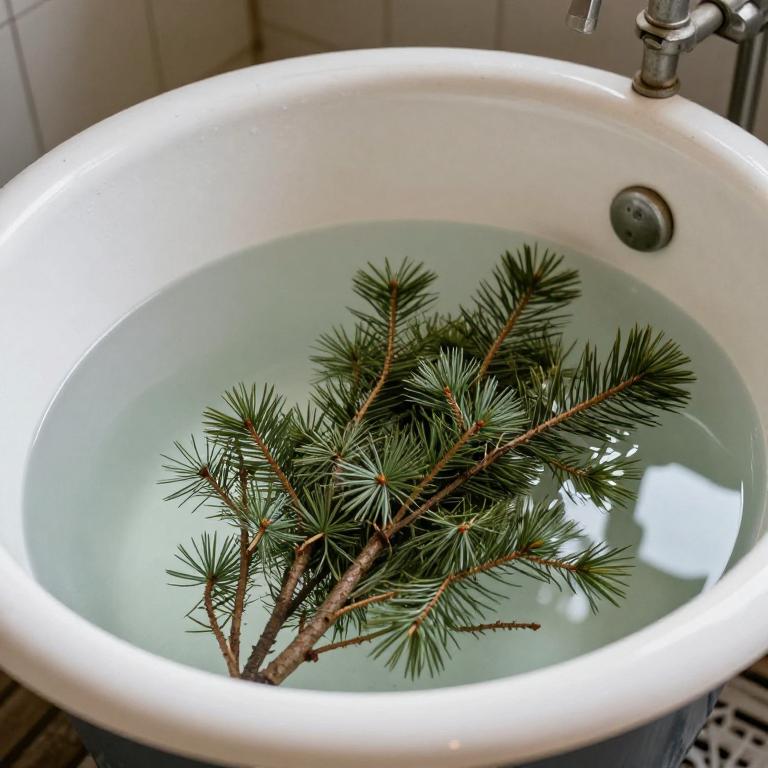10 Best Herbal Baths For Runny Nose

Herbal baths can be a soothing and natural remedy for a runny nose by promoting nasal drainage and reducing inflammation.
Certain herbs like eucalyptus, lavender, and chamomile are commonly used in bath infusions due to their anti-inflammatory and decongestant properties. When added to warm water, these herbs release aromatic compounds that can help open up the airways and ease breathing. The steam from the bath can also help moisturize the nasal passages, providing relief from dryness and irritation.
While herbal baths are generally safe, it's important to consult a healthcare provider if symptoms persist or worsen.
Table of Contents
- 1. Eucalyptus (Eucalyptus globulus)
- 2. Thyme (Thymus vulgaris)
- 3. Salvia (Salvia officinalis)
- 4. Peppermint (Mentha piperita)
- 5. Stinging nettle (Urtica dioica)
- 6. Rosemary (Rosmarinus officinalis)
- 7. Scots pine (Pinus sylvestris)
- 8. English lavender (Lavandula angustifolia)
- 9. Ginger (Zingiber officinale)
- 10. Chamomile (Matricaria chamomilla)
1. Eucalyptus (Eucalyptus globulus)

Eucalyptus globulus, commonly known as the Tasmanian blue gum, is widely used in herbal baths to alleviate symptoms of a runny nose.
The essential oil of eucalyptus globulus contains compounds like cineole and limonene, which have decongestant and anti-inflammatory properties. When added to warm water in a bath, these compounds can be inhaled, helping to clear nasal passages and reduce mucus production. The steam from the bath enhances the absorption of the essential oils, promoting respiratory relief.
This natural remedy is a gentle and soothing option for those seeking relief from a congested nose without the use of pharmaceuticals.
2. Thyme (Thymus vulgaris)

Thymus vulgaris, commonly known as thyme, has been traditionally used in herbal baths to alleviate symptoms of a runny nose, particularly during colds or allergies.
The essential oils in thyme, such as thymol, possess strong antimicrobial and antiseptic properties that can help reduce nasal congestion and inflammation. When infused into bath water, thyme can promote respiratory relief by improving circulation and easing sinus pressure. However, it is important to use thyme baths cautiously, as the essential oils can be potent and may cause skin irritation if not properly diluted.
This natural remedy is often combined with other herbs like eucalyptus or chamomile to enhance its soothing effects on the respiratory system.
3. Salvia (Salvia officinalis)

Salvia officinalis, commonly known as sage, has been traditionally used in herbal baths to help alleviate symptoms of a runny nose.
The essential oils found in sage leaves, particularly cineole and camphor, possess antimicrobial and decongestant properties that may reduce nasal congestion and mucus production. When added to warm bath water, sage can promote steam inhalation, which helps open up the airways and ease breathing. The calming aroma of sage also has a soothing effect on the respiratory system, potentially reducing inflammation and irritation.
While herbal baths can be a natural complement to other remedies, they should not replace professional medical advice, especially for persistent or severe nasal symptoms.
4. Peppermint (Mentha piperita)

Mentha piperita, commonly known as peppermint, is often used in herbal baths to help alleviate symptoms of a runny nose.
The invigorating scent of peppermint can help clear nasal passages by stimulating blood flow and reducing congestion. When added to warm bath water, the essential oils from fresh or dried peppermint leaves can be absorbed through the skin, offering a soothing and decongestant effect. This natural remedy is particularly beneficial for those experiencing sinus pressure or postnasal drip associated with colds or allergies.
However, it is important to use peppermint in moderation and avoid direct contact with the eyes or mucous membranes to prevent irritation.
5. Stinging nettle (Urtica dioica)

Urtica dioica, commonly known as stinging nettle, has been traditionally used in herbal baths to alleviate symptoms of a runny nose.
The plant contains compounds that may help reduce inflammation and congestion in the nasal passages when used in a warm bath. To prepare the bath, fresh or dried nettle leaves are steeped in hot water and then added to warm bath water. This method is believed to promote detoxification and support the body's natural healing processes.
While scientific evidence is limited, many individuals find relief from nasal discomfort through regular use of stinging nettle herbal baths.
6. Rosemary (Rosmarinus officinalis)

Rosmarinus officinalis, commonly known as rosemary, is a versatile herb that has been traditionally used in herbal baths to alleviate symptoms of a runny nose.
When infused into bath water, rosemary's essential oils can help open up nasal passages and reduce congestion through their aromatic properties. The warm water of the bath promotes relaxation and allows the body to absorb the beneficial compounds from the rosemary leaves. This natural remedy is particularly effective for individuals suffering from colds or allergies that cause excessive nasal discharge.
Incorporating rosemary into a bath not only provides relief from a runny nose but also offers a soothing and therapeutic experience for the whole body.
7. Scots pine (Pinus sylvestris)

Pinus sylvestris, also known as Scots pine, has been traditionally used in herbal baths to help alleviate symptoms of a runny nose by promoting nasal congestion relief through its anti-inflammatory and decongestant properties.
The essential oils extracted from the needles of the Scots pine tree contain compounds like alpha-pinene and camphor, which are known to have a soothing effect on the respiratory system. When used in a warm herbal bath, these oils can help open up the airways and reduce mucus production, offering relief from nasal discharge. The aromatic steam from the bath also helps to stimulate the sinuses, enhancing the overall effectiveness of the treatment.
This natural remedy is often recommended for those seeking a holistic approach to managing cold or allergy-related runny noses.
8. English lavender (Lavandula angustifolia)

Lavandula angustifolia, commonly known as English lavender, is often used in herbal baths to alleviate symptoms of a runny nose.
The soothing properties of lavender essential oil help reduce inflammation and ease nasal congestion when added to warm bath water. A lavender bath can promote relaxation and improve overall respiratory comfort, making it a natural remedy for seasonal allergies or colds. The aromatic compounds in lavender also have antiseptic and calming effects, supporting the body's natural healing processes.
Incorporating lavender into a warm bath can be a simple, gentle way to relieve nasal symptoms while promoting a sense of well-being.
9. Ginger (Zingiber officinale)

Zingiber officinale, commonly known as ginger, has been traditionally used in herbal baths to alleviate symptoms of a runny nose, particularly during colds or allergies.
The warming properties of ginger help to soothe nasal congestion and reduce inflammation in the respiratory tract. When incorporated into a bath, the aromatic compounds of ginger are released into the air, providing a soothing effect that can ease breathing and reduce mucus production. This natural remedy is believed to promote circulation and support the body’s natural healing processes.
While it is not a substitute for medical treatment, ginger baths can be a comforting and complementary therapy for those seeking relief from a runny nose.
10. Chamomile (Matricaria chamomilla)

Matricaria chamomilla, commonly known as chamomile, is often used in herbal baths to alleviate symptoms of a runny nose by promoting relaxation and reducing inflammation.
When added to warm bathwater, chamomile's soothing properties can help ease nasal congestion and reduce sinus pressure, offering natural relief for those suffering from colds or allergies. The aromatic compounds in chamomile may also help open up the airways and improve breathing, making it a comforting remedy for respiratory discomfort. Additionally, the calming effects of a chamomile bath can help reduce stress, which is known to exacerbate nasal symptoms.
While not a cure, chamomile herbal baths can be a gentle, complementary therapy to support overall nasal health and comfort.